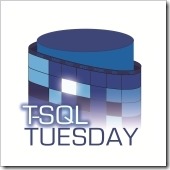There is a lot of discussion about “the cloud”, and how that affects people’s data stories. Today the discussion enters the realm of T-SQL Tuesday, hosted this month by Jorge Segarra.
 Over the years, companies have invested a lot in making sure that their data is good, and I mean every aspect of it – the quality of it, the security of it, the performance of it, and more. Experts such as those of us at LobsterPot Solutions have helped these companies with this, and continue to work with clients to make sure that data is a strong part of their business, not an oversight. Whether business intelligence systems are being utilised or not, every business needs to be able to rely on its data, and have the confidence in it. Data should be a foundation upon which a business is built.
Over the years, companies have invested a lot in making sure that their data is good, and I mean every aspect of it – the quality of it, the security of it, the performance of it, and more. Experts such as those of us at LobsterPot Solutions have helped these companies with this, and continue to work with clients to make sure that data is a strong part of their business, not an oversight. Whether business intelligence systems are being utilised or not, every business needs to be able to rely on its data, and have the confidence in it. Data should be a foundation upon which a business is built.
In the past, data had been stored in paper-based systems. Filing cabinets stored vital information. Today, people have server rooms with storage of various kinds, recognising that filing cabinets don’t necessarily scale particularly well. It’s easy to ‘lose’ data in a filing cabinet, when you have people who need to make sure that the sheets of paper are in the right spot, and that you know how things are stored. Databases help solve that problem, but still the idea of a large filing cabinet continues, it just doesn’t involve paper.
If something happens to the physical ‘filing cabinet’, then the problems are larger still. Then the data itself is under threat. Many clients have generators in case the power goes out, redundant cables in case the connectivity dies, and spare servers in other buildings just in case they’re required. But still they’re maintaining filing cabinets.
You see, people like filing cabinets. There’s something to be said for having your data ‘close’. Even if the data is not in readable form, living as bits on a disk somewhere, the idea that its home is ‘in the building’ is comforting to many people. They simply don’t want to move their data anywhere else.
The cloud offers an alternative to this, and the human element is an obstacle.
By leveraging the cloud, companies can have someone else look after their filing cabinet. A lot of people really don’t like the idea of this, partly because the administrators of the data, those people who could potentially log in with escalated rights and see more than they should be allowed to, who need to be trusted to respond if there’s a problem, are now a faceless entity in the cloud.
But this doesn’t mean that the cloud is bad – this is simply a concern that some people may have.
In new functionality that’s on its way, we see other hybrid mechanisms that mean that people can leverage parts of the cloud with less fear. Companies can use cloud storage to hold their backup data, for example, backups that have been encrypted and are therefore not able to be read by anyone (including administrators) who don’t have the right password. Companies can have a database instance that runs locally, but which has its data files in the cloud, complete with Transparent Data Encryption if needed. There can be a higher level of control, making the change easier to accept.
Hybrid options allow people who have had fears (potentially very justifiable) to take a new look at the cloud, and to start embracing some of the benefits of the cloud (such as letting someone else take care of storage, high availability, and more) without losing the feeling of the data being close.



